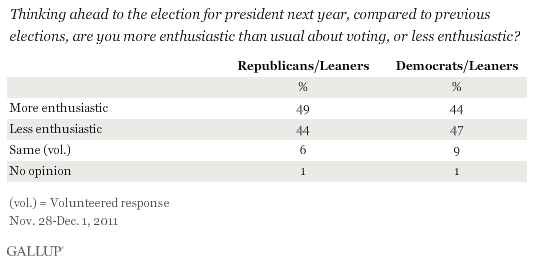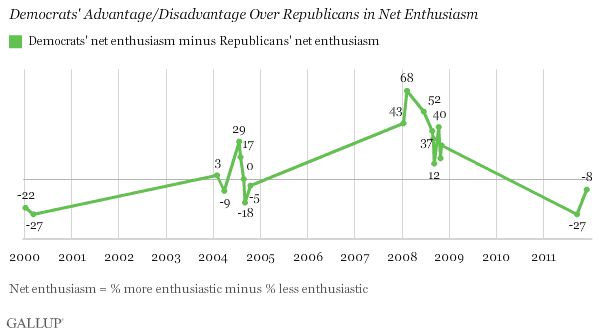PRINCETON, NJ -- Republicans' enthusiasm about voting in the election for president next year has decreased, with 49% of Republicans and independents who lean Republican now saying they are more enthusiastic than usual about voting, down from 58% in September. This narrows the gap between them and Democrats, 44% of whom are more enthusiastic than usual, essentially the same as in September.

These results, from a Nov. 28-Dec.1 Gallup survey, suggest a more even playing field regarding enthusiasm about voting than was the case just two months ago.
Gallup has found that voting enthusiasm generally relates to the eventual election outcome in midterm and presidential election years. In election years in which one party has a clear advantage on enthusiasm, that party tends to fare better in the midterm elections or win the presidential election.
Democrats enjoyed a significant enthusiasm advantage in 2008, for example, as they focused on returning a Democrat to the White House after eight years of Republican control. Similarly, Republicans held the edge on this measure in two surveys in early 2000 -- an election that followed eight years of Democratic control of the White House. In 2004, as Republican George W. Bush sought re-election, the advantage in enthusiasm among Democrats and Republicans fluctuated during the year, but in Gallup's final poll in mid-October of that year, enthusiasm was essentially equal.

The above data for prior years reflect enthusiasm during the election year itself, meaning the best comparisons on enthusiasm across the parties will be in 2012.
Implications
Republicans' enthusiasm about voting has dropped and, as a result, the enthusiasm gap between Republicans and Democrats has narrowed significantly. This marks a change from the decided enthusiasm advantage Republicans enjoyed just two months ago and in last year's midterm elections.
The decrease in Republicans' enthusiasm could reflect the intensive and bruising battle for the GOP nomination going on within the party, and the rapid rise and fall of various candidates in the esteem of rank-and-file Republicans nationwide. Once the Republican nominee is determined next year, Republicans' voting enthusiasm may steady, but whether this is at a high, medium, or low level remains to be seen.
Survey Methods
Results for this Gallup poll are based on telephone interviews conducted Nov. 28-Dec.1, 2011, with a random sample of 1,012 adults, aged 18 and older, living in all 50 U.S. states and the District of Columbia.
For results based on the total sample of national adults, one can say with 95% confidence that the maximum margin of sampling error is ±4 percentage points.
For results based on the sample of 464 Republicans and Republican-leaning independents, the maximum margin of sampling error is ±6 percentage points.
For results based on the sample of 437 Democrats and Democratic-leaning independents, the maximum margin of sampling error is ±6 percentage points.
Interviews are conducted with respondents on landline telephones and cellular phones, with interviews conducted in Spanish for respondents who are primarily Spanish-speaking. Each sample includes a minimum quota of 400 cell phone respondents and 600 landline respondents per 1,000 national adults, with additional minimum quotas among landline respondents by region. Landline telephone numbers are chosen at random among listed telephone numbers. Cell phone numbers are selected using random-digit-dial methods. Landline respondents are chosen at random within each household on the basis of which member had the most recent birthday.
Samples are weighted by gender, age, race, Hispanic ethnicity, education, region, adults in the household, and phone status (cell phone only/landline only/both, cell phone mostly, and having an unlisted landline number). Demographic weighting targets are based on the March 2010 Current Population Survey figures for the aged 18 and older non-institutionalized population living in U.S. telephone households. All reported margins of sampling error include the computed design effects for weighting and sample design.
In addition to sampling error, question wording and practical difficulties in conducting surveys can introduce error or bias into the findings of public opinion polls.
View methodology, full question results, and trend data.
For more details on Gallup's polling methodology, visit www.gallup.com.
